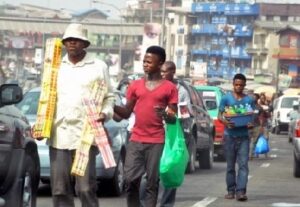Addressing the Challenges of Street Trading and Roadside Parking in Lagos
Addressing the Challenges of Street Trading and Roadside Parking in Lagos

Lagos, Nigeria’s bustling commercial hub, faces significant challenges with street trading and roadside parking. These issues not only disrupt traffic flow but also pose safety hazards for pedestrians and motorists alike.
Street trading, often a necessity for many residents seeking livelihoods, has led to congestion on major roads and intersections. Vendors set up stalls on sidewalks and roadways, making it difficult for pedestrians to navigate and causing potential accidents. Furthermore, this informal trade often lacks regulation, leading to disputes and sanitation concerns.
Roadside parking exacerbates the situation, as vehicles parked haphazardly obstruct traffic and create bottlenecks. With limited parking facilities, many drivers resort to parking on the streets, contributing to chaos in an already congested urban environment.
To effectively address these challenges, a multifaceted approach is essential. This could include:
1. Designated Market Areas: Establishing dedicated market spaces can help relocate street vendors away from busy roads, allowing them to operate without impeding traffic.
2. Enhanced Regulation: Implementing strict regulations on street trading can ensure that vendors adhere to designated areas and maintain cleanliness, benefiting both the vendors and the community.
3. Improved Parking Infrastructure: Expanding parking facilities and implementing a robust parking management system can reduce the prevalence of roadside parking and improve traffic flow.
4. Public Awareness Campaigns: Educating the public about the importance of adhering to traffic regulations and the impact of street trading on urban congestion can foster a more cooperative environment.
5. Collaboration with Stakeholders: Engaging with local businesses, community leaders, and residents can facilitate a collective effort in finding sustainable solutions to these challenges.
By addressing street trading and roadside parking holistically, Lagos can enhance urban mobility, improve public safety, and create a more organized environment for both vendors and residents.
TRENDING SONGS
 NNPC Boss Ojulari Bags UK Energy Institute Fellowship
NNPC Boss Ojulari Bags UK Energy Institute Fellowship
 Shock in Anambra: Bride Disappears Moments Before Wedding
Shock in Anambra: Bride Disappears Moments Before Wedding
 Nigerian Woman Returns ₦330 Million Accidentally Credited to Her Account
Nigerian Woman Returns ₦330 Million Accidentally Credited to Her Account
 APC Don Reach Morocco?’ VeryDarkMan Reacts to Seyi Tinubu Poster
APC Don Reach Morocco?’ VeryDarkMan Reacts to Seyi Tinubu Poster
 Bride Breaks Down in Tears as Wedding Meals Were Kept Secretly While Guests Go Home Hungry
Bride Breaks Down in Tears as Wedding Meals Were Kept Secretly While Guests Go Home Hungry
 Odogwu by Day, Robber by Night: How Marriage Joy Turned Into Tragedy
Odogwu by Day, Robber by Night: How Marriage Joy Turned Into Tragedy
 Nigerian Officials Allegedly Pocket N4–6B Weekly Through Smuggling Cartels at Seme–Badagry Border
Nigerian Officials Allegedly Pocket N4–6B Weekly Through Smuggling Cartels at Seme–Badagry Border
 Ahmad Yerima: Naval Officer to Face No Sanctions After Clash with Wike – Matawalle
Ahmad Yerima: Naval Officer to Face No Sanctions After Clash with Wike – Matawalle
 Trending Video: Muslim Man Joins Wife in Hallelujah Challenge ‘Dress Like Your Miracle’ Night
Trending Video: Muslim Man Joins Wife in Hallelujah Challenge ‘Dress Like Your Miracle’ Night
 Woman Seeks Advice as Late Brother’s Wife Refuses to Mourn Him Following His Death With Alleged Mistress
Woman Seeks Advice as Late Brother’s Wife Refuses to Mourn Him Following His Death With Alleged Mistress
Share this post with your friends on ![]()













